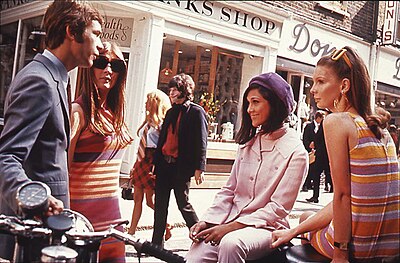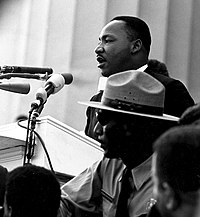Portal:1960s
The 1960s Portal
The 1960s became synonymous with the new, radical, and subversive events and trends of the period. In Africa the 1960s was a period of radical political change as 32 countries gained independence from their European colonial rulers. Some commentators have seen in this era a classical Jungian nightmare cycle, where a rigid culture, unable to contain the demands for greater individual freedom, broke free of the social constraints of the previous age through extreme deviation from the norm. Christopher Booker charts the rise, success, fall/nightmare and explosion in the London scene of the 1960s. However, this alone does not explain the mass nature of the phenomenon. Several nations such as the U.S., France, Germany and Britain turned to the left in the early and mid 1960s. In the United States, John F. Kennedy, a Keynesian and staunch anti-communist, pushed for social reforms. His assassination in 1963 was a stunning shock. Liberal reforms were finally passed under Lyndon B. Johnson including civil rights for African Americans and healthcare for the elderly and the poor. Despite his large-scale Great Society programs, Johnson was increasingly reviled by the New Left at home and abroad. The heavy-handed American role in the Vietnam War outraged student protestors across the globe, as they found peasant rebellion typified by Ho Chi Minh and Che Guevara more appealing. Italy formed its first left-of-center government in March 1962 with a coalition of Christian Democrats, Social Democrats, and moderate Republicans. Socialists joined the ruling block in December 1963. In Britain, the Labour Party gained power in 1964. In Brazil, João Goulart became president after Jânio Quadros resigned. This is a Featured article, which represents some of the best content on English Wikipedia..
 The 1969 Curaçao uprising (Papiamento: Trinta di Mei, 'Thirtieth of May') was a series of riots on the Caribbean island of Curaçao, then part of the Netherlands Antilles, a semi-independent country in the Kingdom of the Netherlands. The uprising took place mainly on 30 May but continued into the night of 31 May – 1 June 1969. The riots arose from a strike by workers in the oil industry. A protest rally during the strike turned violent, leading to widespread looting and destruction of buildings and vehicles in the central business district of Curaçao's capital, Willemstad. Several causes for the uprising have been cited. The island's economy, after decades of prosperity brought about by the oil industry, particularly a Shell refinery, was in decline and unemployment was rising. Curaçao, a former colony of the Netherlands, became part of the semi-independent Netherlands Antilles under a 1954 charter, which redefined the relationship between the Netherlands and its former colonies. Under this arrangement, Curaçao was still part of the Kingdom of the Netherlands. Anti-colonial activists decried this status as a continuation of colonial rule but others were satisfied the political situation was beneficial to the island. After slavery was abolished in 1863, black Curaçaoans continued to face racism and discrimination. They did not participate fully in the riches resulting from Curaçao's economic prosperity and were disproportionately affected by the rise in unemployment. Black power sentiments in Curaçao were spreading, mirroring developments in the United States and across the Caribbean, of which Curaçaoans were very much aware. The Democratic Party dominated local politics but could not fulfill its promise to maintain prosperity. Radical and socialist ideas became popular in the 1960s. In 1969, a labor dispute arose between a Shell sub-contractor and its employees. This dispute escalated and became increasingly political. A demonstration by workers and labor activists on 30 May became violent, sparking the uprising. (Full article...) This is a Good article, an article that meets a core set of high editorial standards.
 On the left, largely obscured, are #60 Sam DeLuca and #70 Sherman Plunkett. The 1961 San Diego Chargers season was the team's second in the American Football League. Following a move from Los Angeles, it was the Chargers' first season in San Diego, where the team remained until returning to Los Angeles in 2017. The Chargers won their first eleven games and clinched the Western Division by mid-November. They lost form in December, with only one victory in their final three regular season games, and finished at 12–2, six games ahead of runner-up Dallas. Like the previous season, the Chargers' season ended with a loss to the Houston Oilers in the AFL championship game, this time 10–3 at Balboa Stadium in San Diego. (Full article...) Selected picture - In the 1960s, Carnaby Street in London was the center for trends and fashions.
Did you know -
Related portalsThis is a Featured article, which represents some of the best content on English Wikipedia..
James Marshall "Jimi" Hendrix (born Johnny Allen Hendrix; November 27, 1942 – September 18, 1970) was an American guitarist, songwriter and singer. He is widely regarded as the greatest guitarist in the history of popular music and one of the most influential musicians of the 20th century. The Rock and Roll Hall of Fame describes him as "arguably the greatest instrumentalist in the history of rock music." Born in Seattle, Washington, Hendrix began playing guitar at age 15. In 1961, he enlisted in the US Army, but was discharged the following year. Soon afterward, he moved to Clarksville, then Nashville, Tennessee, and began playing gigs on the chitlin' circuit, earning a place in the Isley Brothers' backing band and later with Little Richard, with whom he continued to work through mid-1965. He then played with Curtis Knight and the Squires before moving to England in late 1966 after bassist Chas Chandler of the Animals became his manager. Within months, Hendrix had earned three UK top ten hits with his band, the Jimi Hendrix Experience (with its rhythm section consisting of bassist Noel Redding and drummer Mitch Mitchell): "Hey Joe", "Purple Haze", and "The Wind Cries Mary". He achieved fame in the US after his performance at the Monterey Pop Festival in 1967, and in 1968 his third and final studio album, Electric Ladyland, reached number one on the US Billboard 200. The double LP was Hendrix's most commercially successful release and his only number one album. The world's highest-paid rock musician, he headlined the Woodstock Festival in 1969 and the Isle of Wight Festival in 1970 before his accidental death in London from barbiturate-related asphyxia in September 1970. (Full article...) This is a Good article, an article that meets a core set of high editorial standards.
Sir Michael Philip Jagger (born 26 July 1943) is an English musician. He is best known as the lead singer and one of the founder members of the Rolling Stones. Jagger has co-written most of the band's songs with lead guitarist Keith Richards; their songwriting partnership is one of the most successful in rock music history. His career has spanned over six decades, and he has been widely described as one of the most popular and influential front men in the history of rock music. His distinctive voice and energetic live performances, along with Richards' guitar style, have been the Rolling Stones' trademark throughout the band's career. Early in his career, Jagger gained notoriety for his romantic involvements and illicit drug use, and has often been portrayed as a countercultural figure. Jagger was born and grew up in Dartford. He studied at the London School of Economics before abandoning his studies to focus on his career with the Rolling Stones. In the early 1970s, Jagger starred in the films Performance (1970) and Ned Kelly (1970), to mixed receptions. Beginning in the 1980s, he released a number of solo works, including four albums and the single "Dancing in the Street", a 1985 duet with David Bowie that reached No. 1 in the UK and Australia and was a top-ten hit in other countries. (Full article...) Selected article -The Mexican Movement of 1968, also known as the Mexican Student Movement (Movimiento Estudiantil) was a social movement composed of a broad coalition of students from Mexico's leading universities that garnered widespread public support for political change in Mexico. A major factor in its emergence publicly was the Mexican government's lavish spending to build Olympic facilities for the 1968 Olympics in Mexico City. The movement demanded greater political freedoms and an end to the authoritarianism of the PRI regime, which had been in power since 1929. Student mobilization on the campuses of the National Autonomous University of Mexico, National Polytechnic Institute, El Colegio de México, Chapingo Autonomous University, Ibero-American University, Universidad La Salle and Meritorious Autonomous University of Puebla, among others created the National Strike Council. Its efforts to mobilize Mexican people for broad changes in national life was supported by many sectors of Mexican civil society, including workers, peasants, housewives, merchants, intellectuals, artists, and teachers. (Full article...) More Did you know (auto generated)
TopicsCategoriesWikiProjects
Associated WikimediaThe following Wikimedia Foundation sister projects provide more on this subject:
Discover Wikipedia using portals |





























